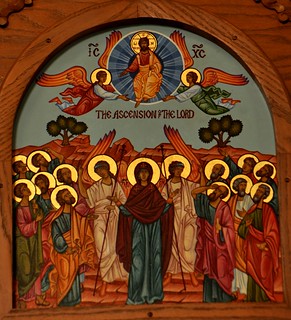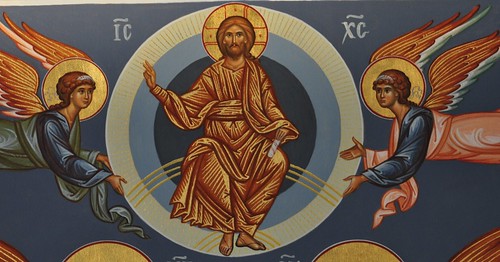Hymns from the Feast of the Ascension of our Lord offer us a banquet table laden with Christian theology – opportunity to understand both our Creator God and what God offers to humanity. Consider for example the Kontakion hymn of the Feast:
When You fulfilled the dispensation for our sake, and united earth to heaven, You ascended in glory, Christ our God, not being parted from those who love You, but remaining with them and crying: I am with you and no one will prevail against you!
There is of course what I often consider the Byzantine playfulness of the hymn: Christ unites earth and heaven by leaving the earth and yet in his departure he is not separated from us but remains with us! Leaving and staying, parting and uniting all at the same time.
 But within the is poetic language there is the theology of the Incarnation of God the Word. Our theology adamantly maintains that though Jesus Christ is fully human, He is also fully God. Though He resided on earth, He was never separated from heaven or from divinity. This is the mystery of the incarnation. But the incarnation is not just some divinely magical mystery. It is our salvation – it serves a purpose. It is the very reason why Christ, the Son of God, came to earth. As St. Athanasius and many others affirmed in one form or another: God became human so that humans might become divine.
But within the is poetic language there is the theology of the Incarnation of God the Word. Our theology adamantly maintains that though Jesus Christ is fully human, He is also fully God. Though He resided on earth, He was never separated from heaven or from divinity. This is the mystery of the incarnation. But the incarnation is not just some divinely magical mystery. It is our salvation – it serves a purpose. It is the very reason why Christ, the Son of God, came to earth. As St. Athanasius and many others affirmed in one form or another: God became human so that humans might become divine.
God became human (John 1:14) – that is the incarnation, but the purpose of this is the salvation of humanity; namely restoring the union between God and humans. God became incarnate so that we humans could participate in the divine nature (2 Peter 1:4). The Ascension of Christ, the human risen from the dead, is the fulfillment of the second half of St. Athanasius’ statement for now in Christ humanity has been raised to the level of divinity. When materialistically minded people ask, “How is this possible, is Jesus floating around in outer space somewhere?”, we can only respond by helping people think outside of that limited, materialistic box. There is a divine mystery here, and we have to stop thinking so literally and materialistically to understand it. We are entering into the mystery of God’s own relationship to His creation. And, in the same way we cannot account for how it is possible for God to become human (to become incarnate, for God to become that which by nature is “not God”), we cannot fully comprehend how humanity can partake of the divine nature. Yet, we claim this is what God intended for humanity all along. At the Ascension we are encountering the other half of the truth of the incarnation; humanity now shares in divinity.
And since our humanity is now united with God in the incarnation, even if Christ is not physically present on earth, He remains united to our human nature. Salvation is that in Christ, we humans are united to Christ who shares our human nature. When we are baptized into Christ, or when we receive Christ in the Eucharist we are united to Christ in heaven while simultaneously still being on earth.
Another hymn from the feast directs our attention to what we also suffer at the ascension of Christ:
Ascending to heaven, from where you came, do not leave us as orphans, Lord. Let Your Spirit come, bringing peace to the world: show the children of mankind the works of Your power, Lord and Lover of mankind!
The ascension of Christ, His departure from earth and return to heaven, does leave us feeling abandoned. The hymns are bluntly honest about what the Ascension feels like. “Wait, we don’t want you to leave! Stay with us instead of leaving us!” But the hymns also remind us that Christ in heaven is still fully human and never separated from our human nature. Additionally, we also receive the Holy Spirit at Pentecost and at our Chrismation. We are not abandoned by God but remain united to divinity.
And another hymn:
 Come, everyone who must return to the earth that which is of the earth, and yield ashes to ashes. Let us rouse ourselves and lift up our eyes and thoughts! Mortals, let us behold the heavenly gates with our eyes and understanding, imagining ourselves present on the Mount of Olives, and beholding the Deliverer carried upon the clouds, for the Lord ascended from there into the heavens, distributing His precious gifts to the apostles and consoling them as their Father, strengthening and instructing them as His children, saying to them: I am not parting myself from you! I am with you, and no one will prevail against you!
Come, everyone who must return to the earth that which is of the earth, and yield ashes to ashes. Let us rouse ourselves and lift up our eyes and thoughts! Mortals, let us behold the heavenly gates with our eyes and understanding, imagining ourselves present on the Mount of Olives, and beholding the Deliverer carried upon the clouds, for the Lord ascended from there into the heavens, distributing His precious gifts to the apostles and consoling them as their Father, strengthening and instructing them as His children, saying to them: I am not parting myself from you! I am with you, and no one will prevail against you!
We mortals, humans who do die, are called at the Ascension of Christ to contemplate our humanity being permanently united to divinity for all eternity. We are united to Christ and He to us in such a way that we can never be separated from Him as long as we are human.
The majesty of the One who assumed poverty by taking flesh has been taken up above the heavens in full view of all. Our fallen nature has been honored, seated together with the Father! Let us all celebrate and shout in harmony, clapping our hands in joy!
The Ascension reveals our salvation: God became human so that humans can partake of divinity. This is Christian theology. It reveals a great mystery about the Holy Trinity, the God who is Love.
 As one of the Persons of the Trinity, Christ the Word of God, shared in the divine glory. God’s glory was Christ’s glory. Christ gave up that glory to become human (Philippians 2:4-9). Christ did not enter into the world in glory. He came into the world humbly, born in poverty in an animal’s cave and placed in a feeding trough. This is part of the mystery of God who by nature is humble and love. God’s glory does not prevent God from becoming human. Humanity is capable of bearing divinity. It was unexpected that God should come into the world, not in all His glory. But then, after being crucified on a cross – humbling himself to death on the cross – Christ the incarnated God ascends in glory. Christ reveals what human nature is capable of and what humans were intended for: complete union with God, partaking of the divine nature, and living in heaven. So we are not abandoned by Christ, nor are we separated from His glory, but we await fully participating in His glory.
As one of the Persons of the Trinity, Christ the Word of God, shared in the divine glory. God’s glory was Christ’s glory. Christ gave up that glory to become human (Philippians 2:4-9). Christ did not enter into the world in glory. He came into the world humbly, born in poverty in an animal’s cave and placed in a feeding trough. This is part of the mystery of God who by nature is humble and love. God’s glory does not prevent God from becoming human. Humanity is capable of bearing divinity. It was unexpected that God should come into the world, not in all His glory. But then, after being crucified on a cross – humbling himself to death on the cross – Christ the incarnated God ascends in glory. Christ reveals what human nature is capable of and what humans were intended for: complete union with God, partaking of the divine nature, and living in heaven. So we are not abandoned by Christ, nor are we separated from His glory, but we await fully participating in His glory.

